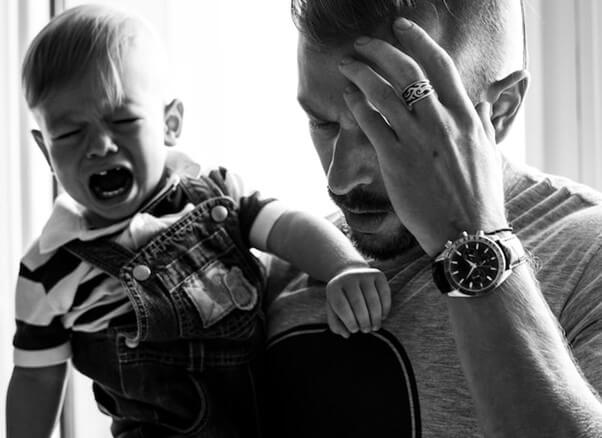It’s normal to feel frustrated when your toddler starts screaming, and you can’t seem to get them to stop. However, it is important to understand why your toddler is screaming before you lose it. That will help you decide how best to handle it and help you reinforce positive and healthy communication. That said, let’s look at some reasons why kids scream and eight steps to stop your toddler from screaming.

Table of Contents
6 Reasons Why Your Toddler Screams
1. Curiosity
Children are naturally curious, and this newfound power can excite them. Thus, they’ll most likely approach screaming like it’s some form of play, and they’ll keep screaming to see how many reactions they can get from you. Don’t worry; with time, screaming will no longer excite them. I still remember my kids were overwhelmed and screamed when they first see moving Mickey Mouse outside of TV in Disneyland.
2. They are Happy
Toddlers are still getting used to dealing with all the new emotions. For example, some kids scream on their birthday party when really happy. They probably can’t tell the difference between indoor voices and outdoor voices. You can gently tell or show your child which voice suits the environment and situation.
Related topic: 6 Pragmatic Steps to Prepare a Toddler’s Birthday Party with Timeline
For example, you can encourage her happy shrieks when you’re out on the playground. However, you can simply say “indoor voice” as you approach the house, which helps her distinguish where she can scream and where she can’t.
3. The Angry Scream
Toddlers tend to express their frustration or anger by screaming. So, if your tot isn’t happy about something, it may result in screaming. In such cases, direct their attention elsewhere. You can read them a book, engage them in an intriguing activity and the likes. Whatever you do, don’t give in to shouting back; control the situation.
The angry scream is similar to tantrums and appear in stages, beginning with a quick warning, then followed by the tantrum, either screaming or crying, it usually lasts 10 to 20 minutes without listening or alert the surroundings. If it happens to be in public, I can totally understand and feel the helpless moment for parents. Finally, when the drama period is passed, kids are tired, red-faced, runny-nosed or there is a period of “hangover” after the tantrum, when the child is tired, red-faced, runny-nosed, and vomited, they needs to be held. Children are often ready to carry on as if nothing had happened!
4. To Call for Attention
Toddlers sometimes scream when they want your attention or they need to change their diapers. When this happens, reach over and pet him reassuringly. A simple wink, smile, or kiss will reassure your kid that you love him and can see him. That way, he knows that while he’s not the center of attention, he’s not being ignored.

5. They Know You’ll Give in When they Scream
Toddlers can learn quickly that screaming is an effective way to get what they want. Therefore we advise that you don’t let them bring you to your knees with their screams. Let them know that you don’t like it when they scream, and once they see that screaming doesn’t make you give in, they will adjust.
6. They Are Overtired
Sleep is very important for toddlers. When they are sleepy but cannot sleep, it is often resulting in unpleasant screaming, especially if it is in the evening when both parents are already exhausted. We have summarized some sleeping tips for toddlers.
- How to Get a Toddler to Sleep: 9 Ways to Help Child Rest
- How to Get Toddler to Take a Nap? 5 Ways to Make it Happen
- 5 Perfect Songs for Toddler in the Bedtime Routine

Unfortunately, you can’t wave your hands in the air and get your toddler to stop screaming. You’ll need a good deal of patience, communication, and understanding. Here are some tips to help you.
1. Remain Calm
Always remember to stay calm through the screaming. It can be quite hard, though, because screaming triggers many unpleasant feelings. We suggest that you step back, take a deep breath, and process all the feelings before responding to your toddler. Remind yourself that your toddler is just a baby, incapable of controlling their emotions. If you feel about to loose control, you can also ignore the screaming by going to another room. By CDC suggestion, once you identified that they are screaming for attention, you may accidentally reward the behavior and increase the chance it will happen again. When you ignore the misbehaviors, you can make it less happen again. .
Once your feelings are in check, get down to your child’s level and calmly remind them that you are there for them. Once they can speak calmly, acknowledge their triggers. You can say something around the lines of “I know you are feeling frustrated, but you can talk about it.” Then encourage them to communicate their feelings.
2. Address their Feelings
Don’t dismiss your child’s feelings. Instead, acknowledge that they are valid with your words. Ask yourself, “what is my child feeling.” Is she frustrated, sad, angry, hungry, or tired? Once you’ve identified the emotion, let your child know that you understand and it is okay to feel that way. However, the emphasis is that it is not okay for them to act out.
While addressing their feelings, ensure that you are firm and yet kind. That way, they understand that you won’t give in to their every demand. Trust us, and if you always give in to their demanding when they scream, your toddler will think screaming is a nice way to request things. Remain firm yet compassionate.

3. Create a Safe Zone
Some children feel better after screaming and letting their pent-up emotions out. In such cases, we recommend showing them a safe spot to scream. You can take them to a closed room to scream their heart away. Alternatively, you can take your child outside to the garden. That way, they associate that spot with screaming and nowhere else. My daughter is irritated when she wake up during deep sleep, there is some tips that I recommend to wake up the toddlers.
Another way is to allow your child to scream into a stuffed animal or pillow. While they scream, reassure them that you are there to help them once they are calm. This will help them recognize that they won’t get any special treatment when they scream. In the same vein, they will realize that you are there for them once they stop screaming.
4. Turn It Into a Game
The best way to teach your child is to model what you want from them. You can take them outside to scream in the early stages, and you can even join in the screaming. Once you come inside, though, engage them in a “whispering game.” When next they start to scream indoors, you can tell them, “let’s play the whisper game.”

5. Direct Verbal Communication
Toddlers need to learn the different communication tones. So, when following your toddler unpleasantly addresses you, quickly correct him. That way, he immediately knows what is acceptable and what is not.

6. Uses Signs
Create verbal cues and gestures to get them back on track when they begin to go out of line. A simple finger to the lips can tell your child to stop screaming. My daughter and I have a secret with each other, when she is screaming, I will say “ice cream”. Because ice cream is her favorite thing, she calms down when she think about it. But we are not buying the real ice cream for bribing her to stop. Follow up the verbal cues with positive words that reinforce the message you are trying to pass across.
7. Let Them Cool Off Outside
New experiences and places can trigger a meltdown in your kid to stop toddler screaming. That or, they may try to get the upper hand by testing your patience with their high-pitched screams. Please don’t give into it. Calmly picked them up and walked out of the room.
Once you are outside, please speak to your child and give them time to cool down. Explain that it is not okay to scream in public places. Don’t just stop there. Give them other alternatives. For example, tell them that they can scream in the garden outside your house (the scream zone).
8. Prepare and Distract Toddlers
When your kids scream in a public place and cannot go outside, such as a plane. Prepare the emergency pack such as snacks, IPAD, books and toys, and of course, yourself. Because people will judge your parenting styles if all does not work, most parents see their toddler screaming as an attack on them or their parenting style. Instead, see their screams as a verbal expression of their feelings inside. You don’t have to protect them from their screams. As long as they understand you are there for them, they will soon figure out how to stop yelling once they calm down.
Final Thoughts and Call for Action
Having a screaming toddler on your hand can be frustrating, however, it is a phase that most toddlers outgrow. Remember to remain calm and reassuring while your kid hits those high decibels. You can teach them to only scream in designated safe zones and reassure them that you are there to listen to them once they calm down.
Once again, remember it is just a phase, and there is no need to turn it into a battle of screams and power. Until then, you can get some earplugs to deal with the noise.
Toddler Related Articles in this blog:
- 10 Best Family-Friendly Shows That Your 2-5 Years Old Toddlers Will Love
- Positive Discipline – How to Get Your Toddler to Listen Without Yelling
- 7 Classic Discipline Strategy That Still Work (on primary school kids)
- 6 Tips to Wake Up a Toddler
- 12 Healthy and Easy Snack Ideas for Kids (New Ideas Inside!)
- 8 Toddler Desk Ideas to Create Concentration
- 8 Youngest Child Traits: Does Birth Order Matter?
- Diet for Children With Diarrhea (Food to Eat)
About Me
Hi, there. I am Lin. Together with my husband and two kids, we live in the beautiful Netherlands in Europe. I am dedicated to self-development, creating quality time for the whole family, and fully supporting kids with their potentials with all I have learned from engineering, MBA, and 10+ years of working experience in the energy sector.





2 Comments
Comments are closed.